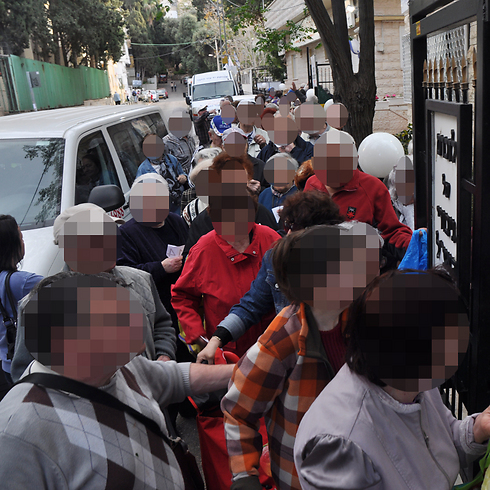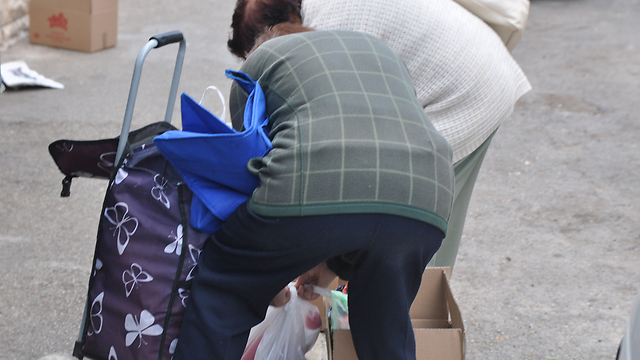
Israel's needy line up for Passover food packages
With government's failure to combat poverty and cuts in child stipends, demand for food sees yet another rise in 2014, says charity organization head.
With Passover just a little over a week away, people are already lining up to receive food packages from the Yad Ezer L'Haver organization, prior even to the beginning of the distribution itself.
Dozens of Israel's elderly are quietly waiting, holding on to market trolleys and IDs, with hopes of receiving what has become in recent years the staples that constitute their holiday meals.
"The demand is much higher than last year," tells Shimon Sabag, the founder of the organization, with a remark that sums up the current reality of life below the poverty line in Israel.
"The package will help me, but I'm afraid there won't be any meat in it," a 65-year old woman waiting in the distribution line said on Thursday.
She emigrated from Romania 15 years ago, but injuries from an accident have prevented her from working or receiving pension benefits, and now she and her husband are just able to make ends meet, with the husband working part time as a street sweeper.
"As it is we barely have enough for food, and what about medicine? In Romania I worked as a school nurse, and now I became a beggar," she said with tears in her eyes.
Related stories:
- 75,000 extra hot meals budgeted for 'nutritional security'
- Report reveals rise in number of poor seniors
- Half a million for anti-poverty committee's 'operation' termed 'outrage' by MKs
Those standing next to her in line, Sabag stressed, are working people who despite their salary, still need a helping hand.
"Sometimes it's enough that someone encounters an unexpected difficulty, and he shortly finds himself in an unfortunate state. This week, we had a young man here who works and earns NIS 6,000 a month, but his wife is on three months of bed rest due to a high risk pregnancy. Since he can't make mortgage payments or payments for his child's kindergarten, the electricity in his home was cut off."
Nutritional insecurity is a well known phenomenon in Israel, and not necessarily a problem that arises during the holiday season. A Social Security report from February found that 18.8 percent of families in Israel suffer from this phenomenon, in one way or another. 8.6 percent of them, according to the report, suffer from severe nutritional insecurity, a state that is characteristic of families that save on food and buy only the cheapest items.
"Expenditures hit their peak around the holidays, and the families that come to us just can't manage to handle it," explained Aharon Cohen, head of Tachlit, another charity organization that also distributes food for the needy.
"The people are simply crying out for help: Expenses on children, food, rent and electricity are a hurdle they can not overcome. Many of them need help all year round, but during the holidays it intensifies."
Against the background of drastic cuts to child benefits, a move that has pushed, according to estimates, thousands of additional families to poverty, the Finance Ministry and Welfare Ministry allocated NIS 230 million ($65.7 million, which constitutes 10 percent of the amount that the Finance Ministry deducted from stipends) to a hot food program intended to provide the poor with food stamps and food products. The program has not yet been implemented.
Now, ahead of the holidays, NIS 7.5 million ($2 million) has been transferred to charities and welfare departments so that they can provide the needy with food packages and food stamps, and another project – with the cooperation of the Ministry of Immigration – will give magnetic cards worth NIS 200 ($57) to 6,000 senior residents who immigrated to Israel, as a supplement to the stipends.
Meanwhile, in Haifa, the statistics and numbers transform into faces and stories.
"I don't know where I'll be for the Seder yet, but I hope I won't be alone. I'll look for a place where I can be with other people," said a 33-year-old man who suffers from a severe illness and has been receiving a disability allowance for the past six months.
"I don't think that we should be ashamed to ask for help, and it's lucky that there are good people who can help. The disability allowance doesn't provide me with enough to buy everything I need, so surely a food package like this can help."
'Alone again, without the country's help'
Apart from the nutritional insecurity, the wider implications of poverty in are considerable, such as inequality in housing affordability, social and welfare services, and education.
According to a Social Security report published in December 2013, there were 439,500 poor families living in Israel in 2012, a total of 1,754,700 people.
According to various reports published by the OECD, the statistics show elderly and child poverty rates that are among the highest in the Western world.
In response, the government established the Committee to Fight Poverty, intended to formulate a wide-scope plan to lower poverty rates in half within a decade.
The committee was supposed to submit its conclusions this week, but announced a last-minute postponement of six months.
According to reports from its discussions, its main recommendation is a significant increase in stipends given to weak population groups, the same stipends that have been drastically cut in recent years.
Eran Weintraub, General Manager of Latet organization, tells of a 20 percent increase in the demand for food ahead of the holidays, "and this year we're starting to feel another rise, apparently due to the failure to treat the situation and the cuts in child stipends. Unfortunately, once again we find ourselves alone, urging the public to pitch in, in order to ensure that everyone can celebrate the holiday with dignity."
Ahiya Raved, Ilana Curiel and Gilad Morag contributed to this report.












